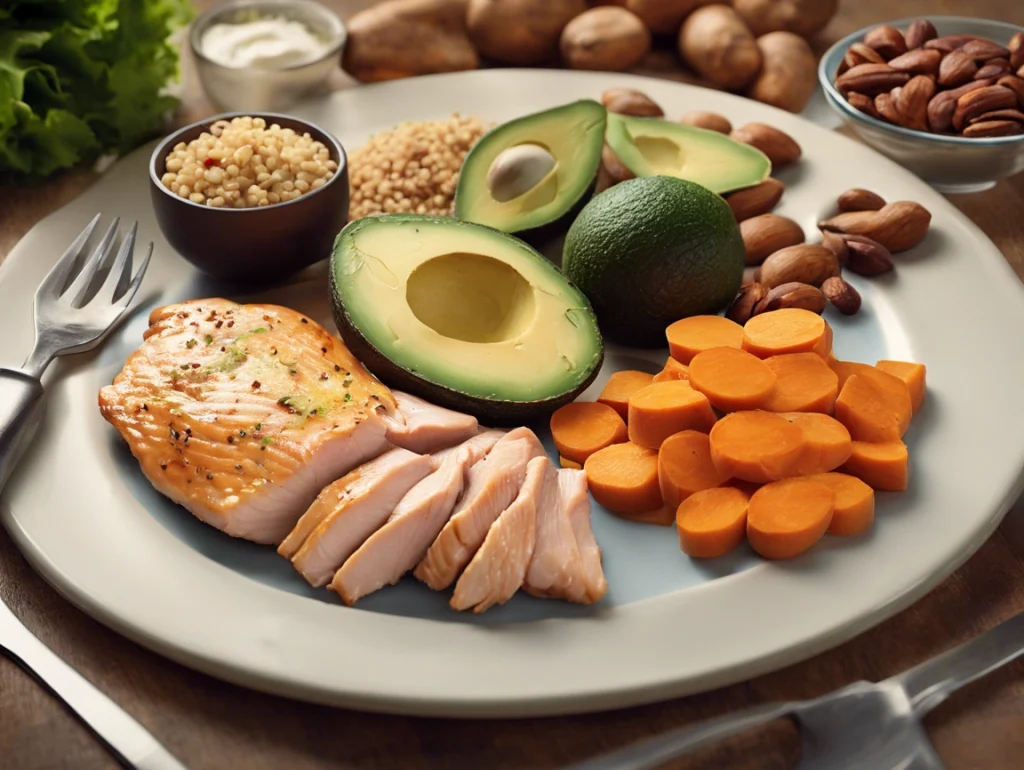When building muscle, nutrition is as important as your training routine. Your muscles need the right fuel to repair, grow, and increase strength. This article outlines five key nutrition strategies to maximize muscle gains and achieve faster results. Following these strategies ensures your body has the necessary nutrients to optimize recovery and build muscle mass.
Why Is Nutrition Important for Muscle Gain?
The process of building muscle requires more than just lifting weights. It also depends heavily on your diet. Your muscles need constant protein, carbohydrates, fats, and other nutrients to repair and grow after exercise. Without proper nutrition, your body won’t be able to support muscle hypertrophy, which is essential for gaining lean muscle mass.
1. How Does Protein Support Muscle Growth?
Protein is the building block of muscles, making it the most critical macronutrient for muscle growth. Your muscle fibers break down when you lift weights or engage in resistance training. Protein helps repair these fibers, leading to muscle hypertrophy.
- Consume Sufficient Protein: Aim for 1.6 to 2.2 grams of protein per kilogram of body weight. For example, if you weigh 80 kg (176 lbs), you should consume between 128 and 176 grams of protein daily to optimize muscle repair and growth.
- Incorporate Lean Protein Sources: Focus on lean protein sources such as chicken, fish, turkey, and eggs, and plant-based proteins like tofu and beans. Supplementing with whey protein or a similar protein powder post-workout can help meet your daily protein needs.
- Spread Protein Intake Throughout the Day: Eating protein-rich meals and snacks every 3-4 hours ensures a constant supply of amino acids vital for continuous muscle repair.
2. Why Are Carbohydrates Crucial for Energy?
Carbohydrates are essential for providing the energy you need to fuel your workouts. They are stored as glycogen in your muscles and used for energy during exercise. When your glycogen levels are low, your muscles may fatigue faster, limiting the effectiveness of your workout.
- Prioritize Complex Carbohydrates: Complex carbohydrates, like brown rice, quinoa, oats, and sweet potatoes, provide long-lasting energy. They are slowly digested, giving you a steady source of fuel for your workouts and aiding in recovery.
- Post-Workout Carbohydrates: After a workout, your glycogen stores are depleted. Consuming simple carbohydrates, like fruits or white rice, immediately after exercise can help replenish glycogen and enhance muscle recovery.
- Balance Your Carb Intake: Adjust your carbohydrate intake depending on your activity level. If you’re training more intensely or frequently, increase your carb consumption to match your energy needs.
3. How Do Healthy Fats Aid Muscle Recovery?
Dietary fats are often overlooked in muscle-building diets, but they play a vital role in hormone regulation, particularly in maintaining testosterone levels, a key hormone involved in muscle growth.
- Incorporate Healthy Fats: Avocados, olive oil, nuts, seeds, and fatty fish (like salmon) are excellent sources of healthy fats. These fats support cell function, reduce inflammation, and assist in hormone production.
- Avoid Trans Fats: While healthy fats are beneficial, trans fats (found in processed and fried foods) should be avoided as they can hinder muscle recovery and negatively affect heart health.
- Include Omega-3 Fatty Acids: Omega-3 fatty acids in fatty fish and flaxseeds have anti-inflammatory properties that help with muscle recovery and reduce soreness after intense workouts.
4. Why Is a Calorie Surplus Essential for Muscle Gains?
To build muscle, you need to consume more calories than your body burns, a calorie surplus. If you do not eat enough calories, your body will not have the energy it needs to build new muscle tissue, no matter how hard you train.
- Find Your Calorie Surplus: Start by calculating your maintenance calories (the number of calories needed to maintain your current weight) and add 250-500 extra calories daily. This moderate surplus will support muscle growth without excessive fat gain.
- Track Your Macros: In addition to maintaining a calorie surplus, balance your macronutrient intake. To optimize muscle growth, aim for 40% of your calories from carbohydrates, 30% from protein, and 30% from fats.
- Monitor Your Progress: Regularly assess your progress and adjust your caloric intake based on how your body responds. If you’re not gaining muscle or strength, increase your surplus slightly.
5. How Do Supplements Enhance Muscle Growth?
Supplements are not a replacement for a balanced diet but can help fill gaps and provide convenience, especially regarding protein and essential nutrients. Here are some key supplements that can support muscle growth:
- Whey Protein: Whey protein is a fast-digesting protein ideal for post-workout recovery. It helps deliver amino acids to muscles quickly, promoting repair and growth.
- Creatine: Creatine is one of the most researched and effective supplements for muscle gain. It increases ATP production in your muscles, giving you more strength and endurance during workouts.
- BCAAs (Branched-Chain Amino Acids): BCAAs can help reduce muscle soreness and promote faster recovery after intense exercise. They are particularly useful during periods of calorie deficit when you’re trying to maintain muscle mass.
- Beta-Alanine: This supplement can help delay fatigue during high-intensity workouts, allowing you to push harder and complete more reps, which is critical for muscle hypertrophy.
Conclusion
To maximize your muscle gains, your nutrition strategy should focus on consuming sufficient protein, prioritizing complex carbohydrates, incorporating healthy fats, maintaining a calorie surplus, and utilizing key supplements. Following these five nutrition strategies can fuel your workouts, promote faster recovery, and achieve muscle gains more effectively.
Consistent nutrition is as important as your workout routine in determining how quickly and efficiently you build muscle. Remember that patience and dedication are key—muscle growth takes time, but with the right nutrition, you’ll be on the path to faster and more sustainable gains.
Read Next…
- Protein Utilization Rate: Best Foods for Muscle Growth and Fat Loss
- Delicious Beef Recipes To Support Muscle Growth
- How to Use a Post-Workout Meal to Build Muscle and Improve Recovery
- Best Pre-Workout Meal for Muscle Building: What to Eat Before Training
- The Role of Diet in Building Muscle: How Much Does It Matter?




